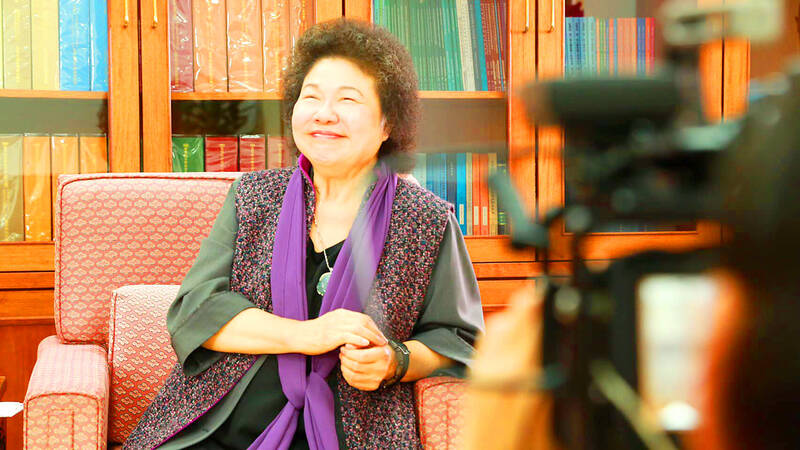The German-Taiwan Association said it has invited Control Yuan President and National Human Rights Commission Chairperson Chen Chu (陳菊) to represent Taiwan at Human Rights Day events in Berlin next month.
The relationship between Taiwan and Germany has been growing closer in the past few months. Last week, German lawmakers Marcus Faber — who is also the association’s chairman — and Holger Becker visited Taiwan.
The two visited the Taiwan Foundation for Democracy, the Institute for National Defense and Security Research, United Microelectronics Corp, the National Development Council and the Legislative Yuan, the association said.

Photo: Screen grab from Chen Chu’s Facebook page
They met with Deputy Minister of Foreign Affairs Tien Chung-kwang (田中光) on Thursday to exchange views on a number of topics, it said.
Before their visit, a seven-member delegation headed by German-Taiwan Parliamentary Friendship Group Chairman Klaus-Peter Willsch arrived in Taipei on Oct. 2 for a five-day visit.
Before that, a delegation led by German lawmaker Peter Heidt arrived for a four-day visit to discuss human rights issues with local officials and academics, and visited the National Human Rights Commission.
German Parliamentary State Secretary at the Federal Ministry for Economic Affairs and Climate Action Franziska Brantner on Tuesday arrived in Taiwan for a two-day visit.
Separately, National Science and Technology Council Minister Wu Tsung-tsong (吳政忠) on Tuesday departed to visit France and Germany.
He met German Minister of Education and Research Bettina Stark-Watzinger to discuss Taiwan’s and Germany’s development of semiconductors and artificial intelligence, as well as the influence of geopolitics on the global supply chain.
Stark-Watzinger said that Taiwan “is an important democratic partner” and “plays an important role in the supply chain of science and technology.”
She hopes that Germany can boost cooperation with Taiwan in science and development, such as research and development of advanced lithium batteries, artificial intelligence, semiconductor technologies and postdoctoral training.
Taiwan values democracy, peace and mutual prosperity, and is willing to work with countries that respect freedom, democracy and human rights, Wu said.
Additional reporting by Chen Chia-i

Taiwan has received more than US$70 million in royalties as of the end of last year from developing the F-16V jet as countries worldwide purchase or upgrade to this popular model, government and military officials said on Saturday. Taiwan funded the development of the F-16V jet and ended up the sole investor as other countries withdrew from the program. Now the F-16V is increasingly popular and countries must pay Taiwan a percentage in royalties when they purchase new F-16V aircraft or upgrade older F-16 models. The next five years are expected to be the peak for these royalties, with Taiwan potentially earning

STAY IN YOUR LANE: As the US and Israel attack Iran, the ministry has warned China not to overstep by including Taiwanese citizens in its evacuation orders The Ministry of Foreign Affairs (MOFA) yesterday rebuked a statement by China’s embassy in Israel that it would evacuate Taiwanese holders of Chinese travel documents from Israel amid the latter’s escalating conflict with Iran. Tensions have risen across the Middle East in the wake of US and Israeli airstrikes on Iran beginning Saturday. China subsequently issued an evacuation notice for its citizens. In a news release, the Chinese embassy in Israel said holders of “Taiwan compatriot permits (台胞證)” issued to Taiwanese nationals by Chinese authorities for travel to China — could register for evacuation to Egypt. In Taipei, the ministry yesterday said Taiwan

‘LIKE-MINDED PARTNER’: Tako van Popta said it would be inappropriate to delay signing the deal with Taiwan because of China, adding he would promote the issue Canadian senators have stressed Taiwan’s importance for international trade and expressed enthusiasm for ensuring the Taiwan-Canada trade cooperation framework agreement is implemented this year. Representative to Canada Harry Tseng (曾厚仁) in an interview with the Central News Agency (CNA) said he was increasingly uneasy about Ottawa’s delays in signing the agreement, especially as Ottawa has warmed toward Beijing. There are “no negotiations left. Not only [is it] initialed, we have three versions of the text ready: English, French and Mandarin,” Tseng said. “That tells you how close we are to the final signature.” Tseng said that he hoped Canadian Prime Minister Mark Carney

POSITIVE DEVELOPMENT: Japan and the US are expected to hold in-depth discussions on Taiwan-related issues during the meeting next month, Japanese sources said The holding of a Japan-US leaders’ meeting ahead of US President Donald Trump’s visit to China is positive news for Taiwan, former Japan-Taiwan Exchange Association representative Hiroyasu Izumi said yesterday. After the Liberal Democratic Party’s landslide victory in Japan’s House of Representatives election, Japanese Prime Minister Sanae Takaichi is scheduled to visit the US next month, where she is to meet with Trump ahead of the US president’s planned visit to China from March 31 to April 2 for a meeting with Chinese President Xi Jinping (習近平). Japan and the US are expected to hold in-depth discussions on Taiwan-related issues during the